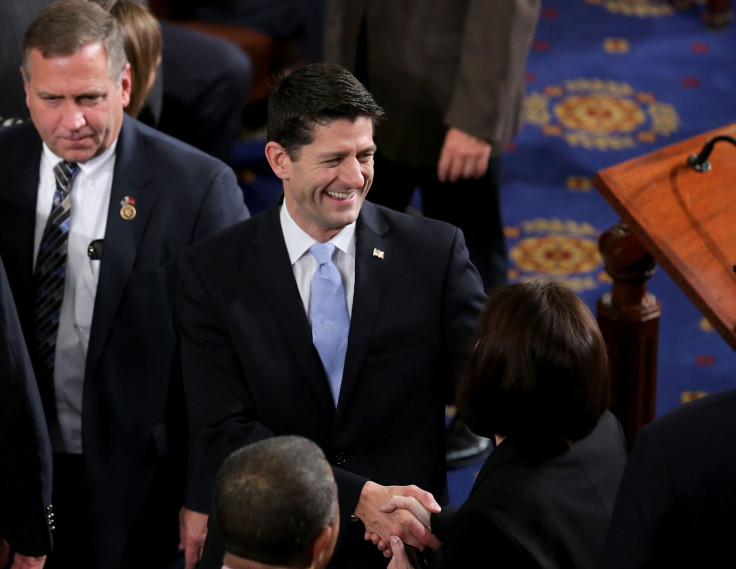As New Speaker Of The House, Will Paul Ryan Affect Entitlement Reforms?

In 2010, when Rep. Paul Ryan, R-Wis., introduced a federal budget plan that included privatizing parts of Social Security and turning Medicare into a privatized voucher program, he was met with great surprise and fierce criticism from Democrats. Many Republicans, too, were afraid to publicly support a plan that involved cuts to two of the government’s most popular programs.
But in 2011, the House passed a similar Ryan budget plan by a vote of 235-193. Though the bill was defeated in the Senate that year, Republicans have since grown increasingly supportive of changing government entitlements -- programs that guarantee benefits to a certain group of people who meet specific requirements -- as both parties have acknowledged the flaws in the country’s current systems.
With Ryan now taking over for Rep. John Boehner as House speaker, it seems likely pushing for the entitlement overhauls he has long championed will earn a spot on the congressman's list of priorities. But in the midst of the 2016 presidential election and uncertainty about the future of Republican control of Congress, Ryan’s new position may not change the fight over entitlement reform significantly.
“Republicans have been committed to something like the Ryan plan for four or five years,” said Joseph White, a professor of public policy at Case Western Reserve University in Ohio who focuses on budget and entitlement policy. The “Ryan plan” is a nickname for the new speaker’s most famous 2012 and 2013 budget proposals, which laid out blueprints for significant changes to Medicare and Medicaid. “The 2012 party platform endorses the basic ideas of Ryan’s plans, and frames them as saving the country from the entitlement state,” he added.
When Ryan was drafted as Mitt Romney’s pick for vice president in the 2012 election, his budget plans got an even wider audience. The Republican Party's platform from that year included a call for general changes to Medicare and Medicaid that looked very similar to the ideas in Ryan’s budget proposals.
The platform suggested raising the age eligibility for Medicare and moving to a “premium support” model, in which enrollees would pay an income-adjusted contribution. It also proposed changing Medicaid to a block grant program that would give states responsibility for the details. As for Social Security, the national party stuck with vague statements about the need for reform, echoing Ryan’s lack of changes to the program.
However, despite the embrace of these ideas at a national party level, not everyone in Congress would be ready to support another push by Ryan to enact entitlement changes. Republican senators said in March they did not think it was appropriate for their budget to include the kind of detailed entitlement reforms Ryan’s proposals have offered in recent years.
“The Senate is a more difficult body because senators represent larger constituencies, which are more mixed [than those of representatives], so they have to pay more attention to fluctuations in their constituencies' opinions,” said Henry Aaron, a senior fellow at the Brookings Institution who serves as the chair of the Social Security Advisory Board.

Many voters, particularly older ones affected by Medicare, Medicaid and Social Security, often don't want to see changes to these programs out of fear they will be stripped of their benefits after paying into the system for years. Social Security in particular is often considered the “third rail” of politics in that it can be deadly for politicians to address, which explains Ryan’s and the Republicans’ focus on Medicare and Medicaid.
A CBS News poll from 2014 indicated 73 percent of adults said Social Security benefits were worth the cost of the program, and an ABC News/Washington Post Poll from the year before found 51 percent of those surveyed opposed changing the way Social Security benefits were calculated.
The budget deal the House passed this week included some entitlement reforms, but was a far cry from Ryan’s earlier plans. The bipartisan agreement includes changes to the Social Security Disability Insurance program and prevents a raise in Medicare B premiums for millions of seniors. Although he was highly critical of the process behind this most recent budget deal, Ryan did say Wednesday he would support the plan.
The plan was created in a flurry of chaos as lawmakers struggled to compromise on a budget amid threats of a government shutdown and the deadline of transitioning House leadership this week. While conservatives in the House generally favor entitlement reform, the reticence from Senate Republicans would likely make it difficult for Ryan to enact huge changes successfully in the near future.
But Ryan’s success at pushing for future changes to Medicare and Medicaid also depends on who wins the presidency in 2016, said Aaron, of the Brookings Institution.
“If there were a Republican president, almost certainly there would still be Republican control of both houses,” Aaron said. “Then Ryan would be influential although more on the topic of Medicare.”
“A majority of the House can do what it wants if it stays unified,” he added. “If Ryan is, as they hope, able to bring about more unity in the party, then the House can pass pretty much whatever they want to pass. But then it has to go through the Senate.”
© Copyright IBTimes 2024. All rights reserved.






















